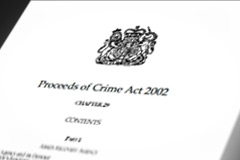Proceeds Of Crime Act 2002
The Proceeds of Crime Act came into force on 24th March 2003. It relates to the recovery and confiscation of proceeds made from criminal activities and money laundering. This potentially includes money and proceeds generated as a result of Tax Evasion.
What is the Proceeds of Crime Act (POCA)?
The Act is the principal money laundering legislation in the UK. It is an Act of Parliament which allows for the confiscation and recovery from the proceeds of crime. This can form a number of guises. Prior to 2002, the main laws regarding the confiscation of illegal gains were governed by the Drug Trafficking Act 1994, or the Criminal Justice Act of 1998. These Acts still apply to any crimes committed prior to the 24th March 2003. The POCA applies to all offences committed after this date.
The Proceeds of Crime is generally defined as the assets or money gained whilst undertaking criminal activity. For Tax Evasion, it will be the amount of money that should have been paid in taxes.
Updates to the POCA
The Act has been amended a number of times since enactment. The most significant changes to the Act were the Serious Organised Crime and Police Act of 2005, the Serious Crime Act 2007 and the Serious Crime Act 2015. As their names suggest, the updates were focused around Serious Crime.
The Process
The first step is to understand how much a defendant needs to pay under the confiscation order. This is done by calculating two figures – the benefit figure and the amount available. Once these two figures have been calculated, the confiscation order can be enforced. The final figure is referred to as the Recoverable Amount. This then determines what the Confiscation Order is.
The start point is that the recoverable amount is equal to the defendant’s benefit from the criminal activity. If the available amount is less, then the recoverable amount is equal to the available amount.
What is the Impact of being Convicted under the Proceeds of Crime Act
The length of a jail term will be dependent on the amount of money ordered to be paid under the Confiscation Order. If you have committed an offence, the prison sentence can be as long as 14 years. As an indication: –
£10,o00 or less to be paid – Max Term 6 months
£10,000-£499,999 – Max Term 5 years
£500,000-£999,999 – Max term 7 years
£1,000,000 million+ – Max term 14 years
If no confiscation order has been set, the court will issue a default sentence.
For More Information
If you have an investigation call Kinsella Tax on 0800 471 4546 for help and advice. We are currently offering meetings via Skype and Zoom. All meetings and calls will be treated in the strictest of confidence.


